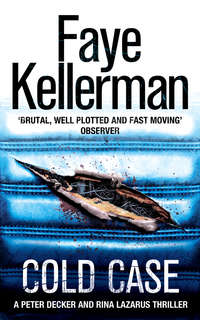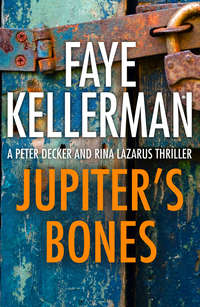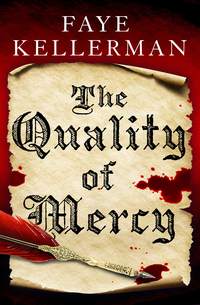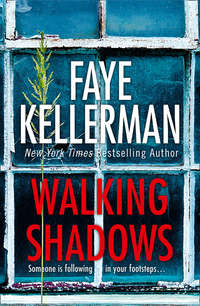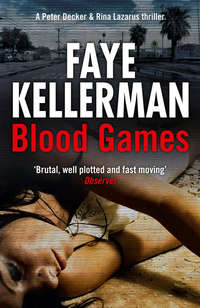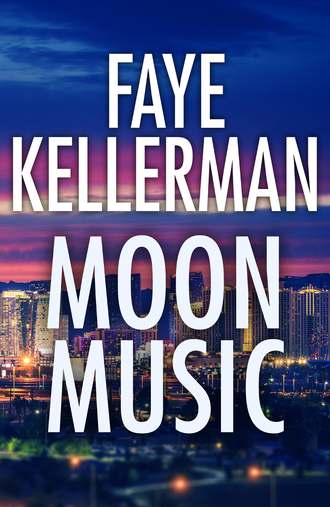
Полная версия
Moon Music
And here she was, feeling as gritty as unwashed spinach, as dirty as a desert rat. She sat at the countertop along with a couple of pickled stragglers waiting for fresh crowds of gamblers to come and liven the evening, her eyes observing the natural ebb and flow of the casino. Cocktail waitresses with big bonkers, wearing gauzy stuff, their flat stomachs with jewels in the navels. They walked two and fro—from casino to bar, from bar to casino.
The bartender approached her. Aladdin he wasn’t. Then again, she was no Jasmine. He was Samoan or Tongan or something that screamed Pacific Islander—an extra-extra-large with frizzy black hair. He wore black harem pants and a purple satin vest over a white see-through shirt. Sandals on his feet. His name tag said Nate.
Wiping the countertop, smiling with white teeth. “’Lo.”
“Club soda,” Patricia answered.
It was now six-thirty. Two hours of scouring the bars for Brittany’s last stand had produced sore feet and a half-dozen hits—servers who somewhat recognized Newel’s face. Unfortunately, no one remembered seeing her yesterday.
Casablanca was bar number twelve on the loo’s hit list. She had consumed twenty—count ’em—twenty club sodas, which necessitated about a dozen trips to the bathroom. How she suffered for her art.
Patricia took out her badge, showed it to Nate, who looked at it without flinching. Didn’t even back away. She was encouraged. Maybe he’d talk without a cattle prod.
“You want a twist with that, Officer?”
“Detective. Homicide.”
His eyes blinked. “Would you like a twist, Detective?”
“Lime.”
“You got it.”
His eyes yo-yoed up and down over her girth, then jumped to her left hand. Patricia smiled to herself. Two humping rhinos.
Not that she was that bad.
Not like after she had left the service—honorable discharge, of course. She had thought she had it together … everything under control. But putting on those civvies, walking out of the base, feeling so dirty and violated. Then seeing him with that evil smile, giving her his famous little wave.
She had gone back to her apartment and had thrown up.
She hadn’t ever been a thin girl. But there was chunky and there was obese, and she had crossed over to the latter. Within two years, she had ballooned to 250 pounds. She had never really figured out why she had suddenly reversed her self-destructive gorging. Maybe she had been sick and tired of letting Homer get the last laugh.
She had starved herself in order to pass the department physical, surviving on air and a can-do spirit. But as soon as she made detective, she had started eating again. Stuffing her face until she had been sure that no superior could possibly be interested in her.
And no one had been. Never even a hint of sexual impropriety.
Perversely enough, the guys had been nice. Supportive. Helpful. Even a pussy hound like Steve was always available to answer questions. Slowly, the pounds started melting. She plateaued at 175. Not bad for someone who was five-eight and big-boned.
Then this whole army sexual harassment thing hit. And Homer had called her—all sweetness and light. Eating to calm her nerves, she gathered her strength, called him, then told him off in explicit terms. It felt good! Unfortunately, she was suddenly back over 200. After a steady diet she was down to 185—holding steady.
Nate placed the club soda in front of her, along with a bowl of peanuts and a bowl of chips. Patricia pushed the bowls aside, took out a picture of Brittany Newel, laid it on the countertop.
Nate turned it around, studied it. “Yeah, I’ve seen her before.”
Surprised by his honesty, she took out her notebook. “When?”
Nate shrugged. “Don’t remember. Maybe a week ago. Maybe two weeks ago.”
“Yesterday?”
Nate actually appeared to be thinking. “This is weird.”
“Go on.”
“I don’t work nights here. I work at Barry’s … a little nothing place, but you wouldn’t believe the tips.”
Patricia nodded as she wrote.
“It’s a workingman’s bar. Not like this.” He screwed up his face in concentration. “I’m not sure. But she might have been there last night.”
Patricia almost choked on an ice cube. “I see.” Calm, girl. “About what time did you see her?”
“I’m not even sure if it was last night. I see a lot of people. I don’t trust my memory.” Nate paused. “You know, I’ll be at the counter there at ten tonight. Why don’t you come down and I’ll introduce you around.”
He gave her the address. She thanked him, said she’d be there at ten.
Suddenly sweating bullets. Moist armpits. Good thing her deodorant was holding. She wiped her face with a napkin. Sand and dirt blacked the pristine white paper. She knew she was filthy. She was embarrassed.
“I need a shower.”
He cleared his throat. “You live far from here?”
She eyed him. “Why?”
“Dinner at eight?” He smiled boyishly. “I know a great Italian buffet, better than anything you can get on the Strip.”
In other words, she looked like a woman who’d eat.
Patricia said, “How about tomorrow?” By then I will have run you through NCIC. “I still have work to do tonight.”
Nate smiled wattage. “Tomorrow would be great!”
She took a final swig of her club soda. “Thanks for your help, Nate. Do you have a last name?”
“Oh sure. Malealani.” He spelled it.
“And where do you live?”
He gave her his address, along with his phone number. Shyly, he said, “I gave you mine. Can I have yours?”
“In due time. I’ll see you tonight at Barry’s.”
“Yeah! Great!”
The guy looked downright goofy. Of course, the costume didn’t help.
She stifled a smile.
He seemed rather innocent … dare she say it, unspoiled. Now, it could be an act. Yet he projected the genuine article. But that was Vegas—a mixture of predator and prey. And even she, as cynical as she was, had trouble telling the teams without a score card.

Exercise. Exorcise.
Stomping furiously on the treadmill, sweat dripping down—pouring down—as if her entire face were crying. Her wet palms were barely able to hold on to the handgrips. In a minute, they’d slip off and she’d go flying into space. Off the belt and into a wall like some Hollywood slapstick stunt. So as long as she could, she pumped her legs, running aslant on the instrument’s full tilt. She felt it in every vertebra of her backbone.
To keep her mind off the pain, Alison thought of her research. The green book. All the answers were there if she’d just take the time to look in it. If she could only get off this blasted treadmill and concentrate on her research.
It drove her crazy. To have to run. But she did it because she was too afraid not to do it. If she stopped, terrible things might happen. The nasty voices could come back. The horrid visions might return—flashing images of blood and guts and sticky stuff. They never came when she was busy. Why leave anything to chance?
Running.
Running to nowhere.
An adequate assessment of her life.
To run, run, run without any fun, fun, fun.
But she stopped short of bludgeoning herself. She had come so far. It used to be that the fear kept her in bed almost twenty-four hours a day. Steve had to carpool, Steve had to cook meals, Steve had to shop and go to parents’ conferences and do everything.
Now she could function. She could shop and pick up the kids from school … smile at the teachers and say hello. Often they’d smile back and say hello, too. And when she left the house, she made sure she was well groomed and presentable.
At times, she was oh so normal. A normal woman doing normal things. But then there were the other times …
So that’s why she ran.
If Mama had run, she might still be around today. But Mama hadn’t run and that had been the problem.
The steady whir of the machine’s motor buzzed through Alison’s head. Her leg muscles contracting and expanding, the exertion building up her lungs and heart and stamina. The exercise was making her strong.
If only Mama had run.
But of course, in her own way, Mama had run. But not in a healthy way. Her strange forays during the night. Two, three o’clock in the morning, she’d be gone. Her disappearances had terrified Alison as a child. Papa had been no help at all, as he had been frantic with worry. Sometimes Mama had stayed away for days in a row. And when she returned … the way she had looked. There had been times when Alison had wished that Mama hadn’t come back—this stranger so silent and sullen, her eyes feral and always bloodshot.
Drinking maybe.
Because her breath had turned fetid. As if she had lived on carrion.
The ensuing arguments. Papa asking her where she had been. Mama saying she didn’t remember. Papa accusing her of lying. Mama going hysterical. Papa begging her to see a psychiatrist. Mama stalking out of the house.
The scene repeated over and over until finally it became moot.
Mama’s nighttime escapades. When she was ten, Alison had asked one of her own psychiatrists about them. Dr. Jones had called them fugue states. Alison looked up the word fugue in her junior dictionary.
A musical form or composition in which a theme is taken up and developed by the various instruments or voices in succession according to the strict laws of counterpoint.
Had Mama been playing music all this time?
The idea puzzled Alison for years. Until she was older and looked the word up in an unabridged dictionary. There were two meanings, the second one stating:
A state of psychological amnesia during which a patient seems to behave in a conscious and rational way, although upon returning to a normal consciousness, the patient cannot remember the period of time nor what was done during it. A temporary flight from reality.
A temporary flight from reality.
Not so temporary in Mama’s case.
When Alison didn’t answer the doorbell, Poe took out his picks. A minute later, he was inside the house. She was exercising on the treadmill, her face as red and wet as a rain-washed plum. Her long legs were cutting long strides to keep up with an unnaturally fast pace. Her fingers were so tightly wound around the handlebars that the knuckles had turned bloodless. Her breathing was fast and furious and much too shallow.
Poe went inside her hallway closet, pulled out an octagonal red stop sign mounted on a dowel handle. He took the sign, placed it in front of her face.
As if she were looking at air.
Even before Poe did it he’d known that this time, it wasn’t going to work. She was running too fast … out of control. Time to take action. Slowly, he reduced the machine’s rate until she was barely walking. He let her go for five minutes, then turned off the treadmill.
She stood in place, not uttering a sound.
“Look at me,” Poe whispered.
Alison met his eyes. Then she dashed into her bedroom. He heard a sudden blast of water rushing through the pipes. He’d give her ten, maybe fifteen minutes tops.
While waiting he realized he was hungry. It was half past six and Poe had eaten his last meal, at Myra’s, well over eight hours ago. He returned Alison’s stop sign to its place in the closet, then went into the kitchen and opened the fridge, happy to see it well stocked. He made himself a meatball sandwich with dark mustard on thick sourdough, poured himself a glass of orange juice. He ate slowly, hoped that the water would stop. Of course, it didn’t.
With reluctance, he got up from the table, went into the bedroom.
Their bedroom.
Into the bathroom.
He opened the shower door, reached inside. The water had turned cold and Alison was shivering. He turned off the taps, placed a bath towel around her shoulders, and led her back into her bedroom, placing her in front of her dresser mirror. Carelessly, she let the towel fall to the floor.
Poe took in her nakedness, tried not to react. He held out her robe, then averted his eyes.
After a moment, she accepted it, slipped it on. Observing herself in her looking glass. She picked up a brush and began ripping into her hair. “I look like shit.”
“You look gorgeous.”
“I can’t figure it out. No matter how long I run on that damn thing, I still have these big, fat thighs!” She pounded her flesh for emphasis. “Like saddlebags.”
“You’re as thin as a cat’s tail. Shame on you for buying into that anorexia shit.”
“Don’t yell at me.”
“You’re overdoing it. It’s not healthy.”
“Can you kindly leave so I can get dressed?”
Poe paused. “All right, I’ll leave. But if I hear the water running—”
“Stop it!” She threw her towel at him. But she was smiling now. And a beautiful smile at that. “Go make yourself useful.”
“By doing …”
“Make some coffee.”
“Where’s your family?”
“Steve took the boys out for dinner.”
“When did they leave?”
Alison gave him a slow, seductive look. “You’re allowed to be here even if he isn’t. I’m not chattel.”
Poe wasn’t too sure about that. “I’ll make some coffee.”
She joined him just as the pot had finished brewing. Dressed in a loose black tunic over black leggings. Her face was awash in an after-exercise blush, her blond hair combed and pulled back in a ponytail, emphasizing perfect cheekbones. Two gold studs decorated her earlobes. Her lips were coated in something pink and wet.
He poured two mugs of coffee: they sat at the kitchen table. The house was ranch-style, a decent-sized thing on a generous lot which held a pool. It had a formal living room and dining room off an entry hall. The back part of the home was made up of an enormous kitchen, a breakfast area, and a den—the true living room of the house. At the moment, it was a bit messy—a stack of old papers, a couple of discarded items of clothing, a dirty dish on the coffee table. But Poe had seen it worse. The bedrooms were on the left side of the house—three of them.
“Why are you here?” Alison asked.
“Just to say hello.”
“Yeah, right.” She sipped coffee. “You’ve got that look in your eyes. What do you want? Besides to sleep with me. The answer is no.”
“Alison, when was the last time I asked you to sleep with me? Like twenty years ago?”
“Try six months ago.”
“What are you talking about?”
“You kissed me, Rom.”
“Alison, it was your birthday—”
“Not a chaste kiss. You gave me tongue.”
“You gave me tongue.”
“I don’t want to talk about this, Rom. Just drop it!”
Poe didn’t respond. Instead, he began drumming his fingers against the tabletop.
Alison put her hand over his to quiet his fidgeting. “Steve was really working last night, wasn’t he?”
“Yes.”
“A corpse in the desert.”
Poe eyed her. “He told you?”
“Occasionally we do talk. He was very upset by it. Did he know the woman, Rom?”
Poe shook his head no.
Alison studied him, scrutinized him. “You’ve become very hard to read.”
Poe said, “It was an awful case. She was … messed up.”
“Stabbed?”
Poe didn’t answer.
“Just spit it out, Rom. I won’t melt. He slept with her, right?”
Poe said, “Alison, do you remember the Bogeyman case?”
Anger coursed through her heart. Fiercely, she glared at him. Poe paled at her fury. “Wha … wha … what’d I say?”
Knowing she was irrationally angry, Alison softened her expression. “You don’t remember, do you?”
He thought: Oh God, what nerve did I touch this time?
The Bogeyman. He had been around ten. Which meant Alison had been seven, maybe eight—
Her mother!
Anything associated with her mother …
He said, “It was right around the time of your mother’s death. I’m sorry, I didn’t think—”
“It’s not just mere association. Think harder.”
Poe was confused, remained silent.
“How could you have forgotten?” she chided.
“I … I’m sorry, but—”
“My mother … her death. The cops had ruled it a suspicious suicide. They came to my house to ask me questions—”
“Oh, Christ!” Mentally, Poe kicked himself. “I don’t believe …”
How could he be so stupid! He had been there. The knock on the door. Two men in suits, one dressed in a cowboy hat and string tie with a turquoise clasp. They came in without even asking permission. Descending on the two of them. Two little kids. They’d been playing Clue—game number twelve or something like that. Her father had asked Poe if he could watch Alison while he did some grocery shopping.
Grocery shopping that took six hours.
Man, her dad had disappeared for a long time.
The men had introduced themselves as detectives. Started asking questions even though her father wasn’t home. Questions about her mother that made her cry. It had been only a month or so after the funeral.
Finally, Y had shown up. The Paiute Indian—an old friend of both his and Alison’s mothers—had materialized like some kind of apparitional savior. Seeing the police questioning two frightened children, the old man went ballistic. Poe still recalled the veins throbbing in the Indian’s red neck. Y had told the cops—in colorful terms—to leave. As far as Poe knew, the fuzz had never returned.
Eons ago. When Y had been strong and vital … Poe said, “Jesus, Alison, I am so sorry.”
“They thought Mama was one of the Bogeyman’s, you know. That she might have been with him the night she … killed herself. Because … she had cut herself up pretty badly.”
Tenderly she reached for his hand.
“You can’t remember everything. I’m sorry. I’m emotional these days.” A small squeeze. “Why did you ask me about it?”
“Doesn’t matter.”
“Does this case remind you of the Bogeyman?”
Poe cleared his throat. “Maybe. From my faded childhood memory, perhaps there are some similarities.”
He waited a beat.
“Faded memory is right. How could I forget? The whole thing … it’s so clear in my mind now. Y popped in during the interrogation. Booted them all out. He was the real hero of the story.”
“Absolutely.” She took her hand off Poe’s. “How is the old man?”
“Same as always. Gambling away his Indian benefits. Both he and my mom …”
Alison said, “He was very close to my mother. I think they were lovers.”
Poe nodded.
“The Bogeyman case had a very disturbing effect on my mother.”
“Alison, we don’t—” Poe stopped himself. If she wanted to talk, let her talk. “Go on.”
She composed her thoughts. “During the murder—rather murders, I think there were two of them—she became unusually agitated. Of course, she was disturbed even before the Bogeyman. But if you’re looking for an excuse as to what drove her over the top, I’d say the killings.”
Poe heard the front door open.
Angrily, Alison whispered, “I wish he’d just go away!”
“I’d better go away.” As Poe started to rise, Alison grabbed his wrist. “What are you afraid of?”
Poe looked at her, sat back down. “Nothing.”
The boys—Harrison and Scott—came charging into the kitchen. Both her sons were redheads like Alison’s father. She hugged them like a mama lion. “Hey, sluggers. How’s it cooking?”
“Hey, Mom,” Scotty answered. “We brought you back some orange chicken and fried rice.”
“Sounds great!”
“I’m going up to my room,” Harrison said. “Homework.”
Scott put the take-out bag on the kitchen table. “I gotta work on my math folder. Then you have to sign it.”
“Fine,” Alison said.
“I mean, you don’t have to read it or anything. Just sign it.”
“I don’t mind reading it.”
“I kinda prefer if you don’t read it.”
“Whatever you want, Scotty.”
The boy looked tenderly toward his mother. “Are you okay?”
Alison forced herself not to cry. “Great.”
Still, Scotty was skeptical. He kissed his mother’s cheek. “Take care. Bye.”
Alison stood up and gave her husband a half-smile. “Thanks for taking them out.”
Jensen kissed her on the lips, throwing Poe daggers from the corners of his eyes. Easy to think the worst. But he knew Alison. Moreover, he knew Poe. Married women weren’t his thing. “Am I interrupting anything?”
“Not at all,” Alison chirped. “You want some coffee, Steve?”
Jensen forced himself to smile. “No, I’m fine.” He saw Poe getting up, said, “Don’t let me rush you.”
Feeling as wanted as ice on jet wings, Poe said, “Gotta go. Certain people await me.”
Jensen mouthed, “Lewiston?”
Poe nodded.
Jensen said, “I’ll walk you out, Boss.”
“’Night, Alison.” Pointedly, Poe kissed her cheek. Just to show him it was all very innocent.
“’Night.” She turned her back and busied herself at the counter.
As soon as they were out of her sight, Jensen grabbed Poe’s arm, shoving him out of the house. He slammed the front door behind them, all pretense of calm dissipating like smoke. “What did you two talk about?”
“Get your goddamn hands off me!”
Jensen blushed, dropped Poe’s arm. He said, “What did you two talk—”
“None of your business,” Poe answered. “And don’t you dare interrogate your wife to get answers—”
“I’m not interrogating her, I’m interrogating you.” Jensen spun 360 degrees on his heels, faced Poe with rage. “You think it’s jealousy, don’t you? You think I’m this big, bad jealous schmuck who’s—”
“Steve, I don’t know what you’re talking about.”
“You don’t goddamn get it, do you? Every time you talk to her and start reminiscing about the good ole days, it sets her back. You don’t see it. Because to you, your little talks are nothing but great fun. And because when she talks to you, she puts on her normal act—”
“Steve—”
“—but get her a couple hours later, when you’re long gone, out screwing your whores or girlfriend or playing your cards being Mr. Asshole Carefree Bachelor, then she’s left alone. And when she’s alone, she sinks, Rom. And guess who has to deal with her shit!”
No one spoke.
Jensen exhaled forcefully. “Every time you come to visit, you put her back six months’ worth of therapy.”
Again, there was silence.
Jensen said, “In case you haven’t noticed, she’s very fragile and disturbed—”
“I’m well aware—”
“You aren’t aware of anything except what she tells you. And that’s always her own slant. Her own bizarre thoughts. I’m not saying she can’t be helped. But you ain’t the one to do it, all right?”
Poe stuck his hands in his pocket, eyes looking upward, into a black, starry sky. “If I’ve been … causing problems between you and your wife, I apologize.”
“I don’t need your apologies, Rom. I need you to leave her alone. Understand?”
“Clearly.”
Jensen suddenly wilted, exhausted and spent. “Weinberg’s looking at me strange. You didn’t tell him about—”
“No.”
“She ask about the case at all?”
“Who? Alison?”
Jensen nodded.
“Yeah. She said you were very upset last night. She asked whether you had slept with the victim.”
“And you told her no?”
“I won’t dignify that with an answer.”
Neither spoke for a moment.
Poe said, “You find out anything?”
“About Brittany?” Jensen shrugged. “Nothing that points to a killer. Just bits and pieces.”
“We should meet, compare notes with Patricia.”


